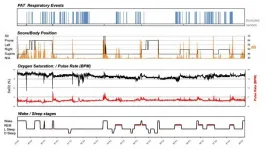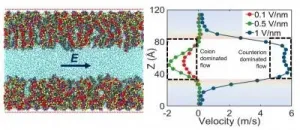(Press-News.org) COLUMBUS, Ohio - A high daily dose of an omega-3 supplement may help slow the effects of aging by suppressing damage and boosting protection at the cellular level during and after a stressful event, new research suggests.
Researchers at The Ohio State University found that daily supplements that contained 2.5 grams of omega-3 polyunsaturated fatty acids, the highest dose tested, were the best at helping the body resist the damaging effects of stress.
Compared to the placebo group, participants taking omega-3 supplements produced less of the stress hormone cortisol and lower levels of a pro-inflammatory protein during a stressful event in the lab. And while levels of protective compounds sharply declined in the placebo group after the stressor, there were no such decreases detected in people taking omega-3s.
The supplements contributed to what the researchers call stress resilience: reduction of harm during stress and, after acute stress, sustained anti-inflammatory activity and protection of cell components that shrink as a consequence of aging.
The potential anti-aging effects were considered particularly striking because they occurred in people who were healthy but also sedentary, overweight and middle-aged - all characteristics that could lead to a higher risk for accelerated aging.
"The findings suggest that omega-3 supplementation is one relatively simple change people could make that could have a positive effect at breaking the chain between stress and negative health effects," said Annelise Madison, lead author of the paper and a graduate student in clinical psychology at Ohio State.
The research is published today (Monday, April 19, 2021) in the journal Molecular Psychiatry.
Madison works in the lab of Janice Kiecolt-Glaser, professor of psychiatry and psychology and director of the Institute for Behavioral Medicine Research at Ohio State. This paper is a secondary analysis of one of Kiecolt-Glaser's earlier studies showing that omega-3 supplements altered a ratio of fatty acid consumption in a way that helped preserve tiny segments of DNA in white blood cells.
Those short fragments of DNA are called telomeres, which function as protective caps at the end of chromosomes. Telomeres' tendency to shorten in many types of cells is associated with age-related diseases, especially heart disease, and early mortality.
In the initial study, researchers were monitoring changes to telomere length in white blood cells known as lymphocytes. For this new study, the researchers looked at how sudden stress affected a group of biological markers that included telomerase, an enzyme that rebuilds telomeres, because levels of the enzyme would react more quickly to stress than the length of telomeres themselves.
Specifically, they compared how moderate and high doses of omega-3s and a placebo influenced those markers during and after an experimental stressor. Study participants took either 2.5 grams or 1.25 grams of omega-3s each day, or a placebo containing a mix of oils representing a typical American's daily intake.
After four months on the supplements, the 138 research participants, age 40-85, took a 20-minute test combining a speech and a math subtraction task that is known to reliably produce an inflammatory stress response.
Only the highest dose of omega-3s helped suppress damage during the stressful event when compared to the placebo group, lowering cortisol and a pro-inflammatory protein by an average of 19% and 33%, respectively.
Results from blood samples showed that both doses of omega-3s prevented any changes in telomerase levels or a protein that reduces inflammation in the two hours after participants experienced the acute stress, meaning any needed stress-related cell repair - including telomere restoration - could be performed as usual. In the placebo group, those repair mechanisms lost ground: Telomerase dropped by an average of 24% and the anti-inflammatory protein decreased by an average of at least 20%.
"You could consider an increase in cortisol and inflammation potential factors that would erode telomere length," Madison said. "The assumption based on past work is that telomerase can help rebuild telomere length, and you want to have enough telomerase present to compensate for any stress-related damage.
"The fact that our results were dose-dependent, and we're seeing more impact with the higher omega-3 dose, would suggest that this supports a causal relationship."
The researchers also suggested that by lowering stress-related inflammation, omega-3s may help disrupt the connection between repeated stress and depressive symptoms. Previous research has suggested that people with a higher inflammatory reaction to a stressor in the lab may develop more depressive symptoms over time.
"Not everyone who is depressed has heightened inflammation - about a third do. This helps explain why omega-3 supplementation doesn't always result in reduced depressive symptoms," Kiecolt-Glaser said. "If you don't have heightened inflammation, then omega-3s may not be particularly helpful. But for people with depression who do, our results suggest omega-3s would be more useful."
The 2.5-gram dose of omega-3s is much higher than what most Americans consume on a daily basis, but study participants showed no signs of having problems with the supplements, Madison said.
INFORMATION:
The research was supported in part by grants from the National Institutes of Health.
Additional Ohio State co-authors include Martha Belury, Rebecca Andridge, Megan Renna, Rosie Shrout and William Malarkey.
Contacts:
Annelise Madison, Annelise.Madison@osumc.edu
Janice Kiecolt-Glaser, Janice.Kiecolt-Glaser@osumc.edu
Written by Emily Caldwell, Caldwell.151@osu.edu
A Monash University study has uncovered for the first time a way to prevent and reverse damage caused by broken-heart syndrome, also known as Takotsubo cardiomyopathy.
Using mouse models, the pre-clinical study published in the acclaimed journal Signal Transduction and Targeted Therapy, has shown the cardioprotective benefit of a drug called Suberanilohydroxamic acid, or SAHA, dramatically improved cardiac health and reversed the broken-heart. The landmark study used SAHA to target genes and is a world first for Takotsubo cardiomyopathy.
SAHA, currently used for cancer treatment, is approved by the US Food and Drug Administration (FDA) and Australian Therapeutic Goods Administration (TGA), works by providing a protective benefit to genes and ...
For the first time, a study has shown a clear link between the frequency and duration of unconscious wakefulness during night-time sleep and an increased risk of dying from diseases of the heart and blood vessels, and death from any cause, particularly in women.
The study of 8001 men and women, which is published today (Tuesday) in the European Heart Journal [1], found that women who experienced unconscious wakefulness most often and for longer periods of time had nearly double the risk of dying from cardiovascular disease during an average of between 6 and 11 years' ...
Taking multivitamins, omega-3, probiotics or vitamin D supplements may lessen the risk of testing positive for SARS-CoV-2, the virus responsible for COVID-19 infection--at least among women--indicates a large population study, published online in the journal BMJ Nutrition Prevention & Health.
But taking any of vitamin C, zinc, or garlic supplements wasn't associated with a lower risk of testing positive for the virus, the findings show.
There has been plenty of celebrity endorsement of the use of dietary supplements to both ward off and treat COVID-19 infection since the start of the pandemic, note the researchers.
In the UK alone, market share ...
Nanochannels have important applications in biomedicine, sensing, and many other fields. Though engineers working in the field of nanotechnology have been fabricating these tiny, tube-like structures for years, much remains unknown about their properties and behavior.
Now, University of Maryland mechanical engineering associate professor Siddhartha Das and a group of his Ph.D. students have published surprising new findings in the journal ACS Nano. Using atomic-level simulations, Das and his team were able to demonstrate that charge properties as well as charge-induced fluid flow within a functionalized nanochannel does not always behave as expected.
"We've discovered a new context for nanochannels functionalized by grafting ...
One of the marks of a successful idea in science is how quickly it can develop and evolve. In the case of the Anthropocene, the conceptual evolution has taken place with extraordinary speed. The strikingly influential hypothesis launched by the late Nobel laureate Paul Crutzen (Obituary, 24th Feb 2021) in 2000, was that the actions of an industrialised humanity has impacted the Earth so greatly as to trigger a new geological epoch. Originally developed within the Earth System science community in charting global environmental change, the Anthropocene then began ...
April 19, 2021 -- Ensuring COVID-19 vaccine access for refugee and displaced populations, and addressing health inequities, is vital for an effective pandemic response. Yet, vaccine allocation and distribution has been neither equitable nor inclusive, despite that global leaders have stressed this as a critical aspect to globally overcoming the pandemic, according to a paper published by Columbia University Mailman School of Public Health. Read "Leave No-one Behind: Ensuring Access to COVID-19 vaccines for Refugee and Displaced Populations" in the journal Nature Medicine.
As of April 1st, high and upper-middle-income countries received 86 percent of the vaccine doses delivered worldwide, while ...
Tools that allow neuroscientists to record and quantify functional activity within the living brain are in great demand. Traditionally, researchers have used techniques such as functional magnetic resonance imaging, but this method cannot record neural activity with high spatial resolution or in moving subjects. In recent years, a technology called optogenetics has shown considerable success in recording neural activity from animals in real time with single neuron resolution. Optogenetic tools use light to control neurons and record signals in tissues that are genetically modified ...
A group of scientists have just made a key discovery that could prevent and eradicate immune responses that lead to treatment failure in about one-third of people with severe hemophilia A.
Hemophilia is the most common severe inherited bleeding disorder in men. The disease affects 1 in 10,000 males worldwide and results from deficiency of blood clotting factor VIII (FVIII). Both children and adults with hemophilia A (80 percent of all hemophilia) receive treatment that involves infusing FVIII protein into the bloodstream. However, about 30 percent ...
Our planet's worst mass extinction event happened 252 million years ago when massive volcanic eruptions caused catastrophic climate change. The vast majority of animal species went extinct, and when the dust settled, the planet entered the early days of the Age of Dinosaurs. Scientists are still learning about the patterns of which animals went extinct and which ones survived, and why. In a new study in PNAS, researchers found that while extinctions happened rapidly in the oceans, life on land underwent a longer, more drawn-out period of extinctions.
"People assumed that because the marine extinction happened over a short period of time, life on land should have followed the same pattern, but we found that the marine extinction ...
Professor Nicole Boivin, Director of the Department of Archaeology at the Max Planck Institute for the Science of Human History in Jena, Germany, is part of an international initiative to examine the implications of past land use for contemporary conservation efforts.
The multi-disciplinary team, which includes archaeologists, ecologists, anthropologists and conservation managers, has reconstructed ancient population and land use to show that already by 12,000 years ago, humans had re-shaped much of the terrestrial biosphere.
Their data challenge the idea that conservation ...




